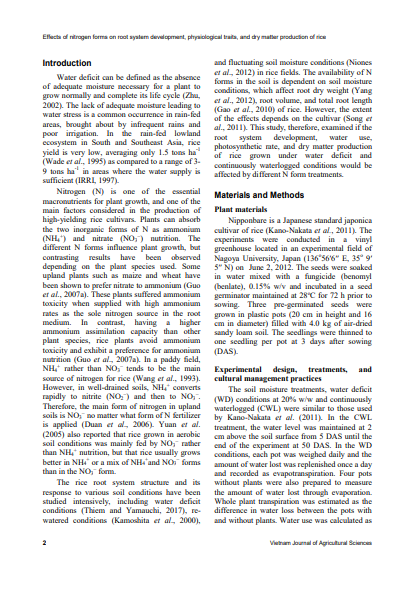Evaluating the Knowledge of Small and Medium Enteprises’ Managers in Presenting the Information on Financial Statements toward International Integration
1Faculty of Accounting and Business Management, Vietnam National University of Agriculture, Hanoi 131000, Vietnam
Main Article Content
Abstract
In the context of international integration, managers’ knowledge plays an important role as a valuable organizational resource from a strategic perspective and a foundation for competitive advantage in business environment. The aim of this paper was to build assessment model and attest it in the case of Vietnam’s Small Medium Enterprises (SMEs) regarding manager’s knowledge in preparing the information on financial statements. By analyzing current relative standards (including international and national systems) and two basic assessment models (ASK by Bloom et al. (1956) and BKD by Shinseki (1999)), the study developed to identify the assessment criteria of the manager’s knowledge as one main research objective. The research data of 71 SMEs in the sample showed that: (i)The relationship between managers’ background and their understanding about information on their financial statements was a negative linkage; (ii) The number of managers using their financial statements to make a business decision was very low; and (iii) The most important criteria on the financial statement in their views were profits and revenues.
Article Details
References
-
Arisha A. & Ragab M. (2013). Knowledge Management and Measurement: a Critical Review. Journal of Knowledge Management. 17(6): 873-901.
Bloom B. S., Engelhart M. D., Furst E. J., Hill W. H. & Krathwohl D. R. (1956). Taxonomy of Educational Objectives- The Classification of Educational Goals. Published by David Mckay Company Inc. 216 pages.
Hunt D. P. (2003). The concept of knowledge and how to measure it. Journal of Intellectual Capital. 4(1):100-113.
Federica C.-L. (2006). Evaluation: definitions, methods and models -An ITPS framework. Working paper, No. R2006:002, Swedish Institute For Growth Policy Studies, 39 pages. Retrieved from https://pdfs.semanticscholar.org/6847/9ec9fc396e1a3f1ab859502e2e0cb0267d41.pdf on November 18, 2018.
IASB (2018). Conceptual Framework for Financial Report. Retrieved from https://www.ifrs.org/issued-standards/list-of-standards/conceptual-framework/ on December 18, 2019.
Kucza T. (2001). Knowledge Management Process Model. Espoo 2001. Technical Research Centre of Finland, VTT Publications 455.101 p. + app. 3 p.
Nonaka I. & Takeuchi H. (1995). The Knowledge-Creating Company. Oxford University Press, Oxford, New York, 1995.
Nguyen Viet Loc (2012). Vietnamese entrepreneur cultural on the process of International Integration. Doctoral thesis. VNU University of Economics & Business. 186 pages (in Vietnamese).
Le Thi Phuong Thao (2016). Study on the leadership capacity of managers of SMEs in the North Central Area in Vietnam. Doctoral thesis. VNU University of Economics & Business. Hue college of economics, Hue University. 165 pages (in Vietnamese).
Le Quan & Nguyen Quoc Khanh (2012).Assessing competences of CEOs in Vietnamese small enterprises through ASK approach.VNU Journal of Science- Economics & Business. 28(2012): 29‐35.
Olsson E. J. (2011). The Value of Knowledge. Philosophy Compass. 6(12): 874-883.
Phi Thi Diem Hong (2017). A comprehensive study of accounting system and
consolidated accounting in Vietnam: Focusing on the factor analysis of consolidatedfinancial statements. Doctoral thesis. Komazawa University, Tokyo, Japan.
Shinseki E. K. (1999). Army Leadership: Be, Know, Do. Field Manual No.22-100 (FM 22-100). Headquarters , Department of the Army. Washington, DC, 31 August 1999. 270 pages.
Sveiby K. E. (1997): The New Organisational Wealth, Managing and Measuring Knowledge-Based Assets, Berrett-Koehler San Fransisco. CA: Berrett-Koehler Publishers, Inc. 236 p.
Tran Thi Phương Tran Thi Phuong Hien (2014). Leadership competency of Vietnam CEOs ( research in Hanoi).Dotoral thesis.National Economics University. 167 pages (in Vietnamese).
VCCI (2016). Provincial Competitiveness Index2015-PCI 2015-Evaluate the quality of economic governance to promote business development. Labor Publishinh House, 2016. 106 pages (in Vietnamese).
World Bank (2013).Vietnam development report 2014: Preparing the work force for a modern market economy (Vol. 2): Main report (English). Washington DC; World Bank. Retrieved from http://documents.worldbank.org/curated/en/610301468176937722/Main-report on December 10, 2019.
World Bank (2016). The Reports on the Observance of Standards and Codes (ROSC) - Accounting and Auditing Module, Vietnam 2016, Hong Duc Publishing House. ISBN: 978-604-89-1352-6.
World Bank (2017). Vietnam: Enhancing Enterprise Competitiveness and SME Linkages-Lessons from international and national experience, Trade and Competitiveness Global Practice the World Bank Group, Public Disclosure Authorized: 1-106.

